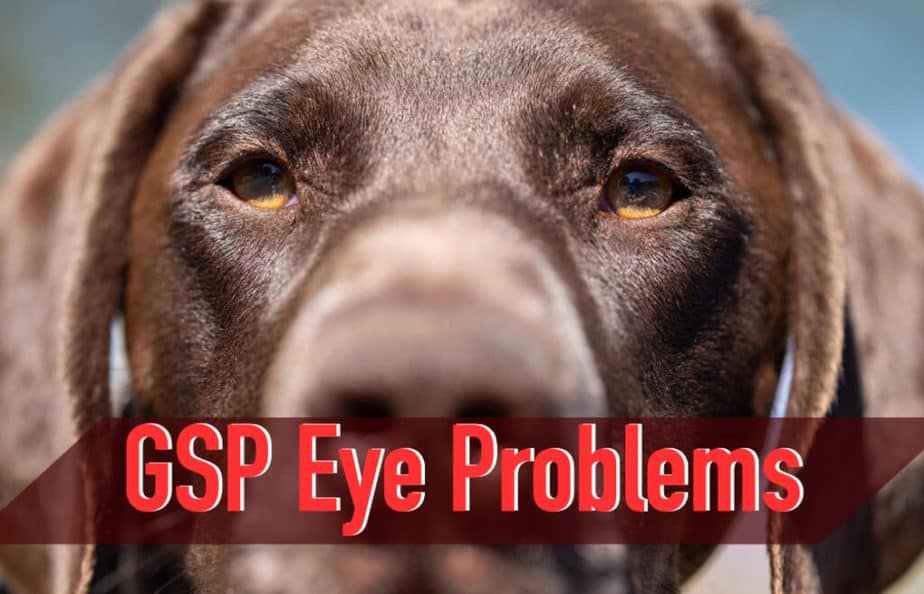Do German shorthaired pointers have eye problems?
Unfortunately, German shorthaired pointers are no strangers to eye problems.
Everyone knows dogs guide themselves via their sense of smell. Not only that, but they can hear way better than any of us can.
That doesn’t mean they don’t need their eyes to see the world, though. Because of that, as pet owners, we should always pay attention to any issues our dogs may have.
Some eye problems tend to be specific to each breed. In this article, we’ll talk about the eye problems German shorthaired pointers may have.

More importantly, we’ll tell you what to do when you find out your GSP may have something wrong in their eyes.
While not necessarily common, there’s a fair amount of GSPs that go blind – sometimes in the early stages of their life.
That’s not to say your pup may go blind! Most eye problems are treatable, and a lot of them can be permanently fixed with meds or surgery.
You have to watch for issues early on, though – the sooner you catch them, the better.
Common eye problems in GSPs include:
* Cataracts: One of the most common issues you may find in GSPs. Cataracts usually appear early on (as early as six months old) and can cause permanent blindness in your pup.
Signs of cataracts are not hard to notice, as this will cause your dog’s eyes to change in color from black to a more pale or opaque tone.
Past a certain point, your vet may ask you to consider surgery to remove the problem and restore your dog’s vision – although sometimes that will not be necessary.
* Distichiasis: Another common issue in dogs (and GSPs in particular) is abnormally large hairs that get inside the eye, also known as distichiasis. If left unchecked, these hairs will poke the eye, eventually hurting it and causing corneal ulcers. As you can imagine, this is rather painful for your dog.
Fortunately, there’s more than one way to treat this problem, and the solution is often permanent.
* Entropion: Similar to distichiasis, entropion causes your dog’s eyelids to roll inward.
When that happens, the eyelashes rub against the eye and create enough friction and damage to blind your dog. Entropion tends to be genetic. If your German shorthaired pointer has this problem, surgery can fix it.
* Pannus: Redness in your dog’s eyes could be mistaken for conjunctivitis – but it could also be pannus. This disease could potentially blind your dog; because of that, you should check with a vet if the symptoms match.
The good thing is that medication is more than enough to cure this illness. Your dog may also have to wear doggy sunglasses to protect its eyes against UV rays, which looks pretty cool and adorable.
How to treat German shorthaired pointer’s eye problems
Regular checkups
The best way to prevent any issues and stop problems right in their tracks is to get ahead of the situation. That’s why regular checkups with the vet are important!
When you first adopt a puppy, you will probably go to the vet once every few months; then, you’ll start doing yearly checkups to make sure everything is okay.
Of course, you should run to the vet if you think something is wrong.
Have you noticed redness, irritation, or something off in your dog’s eyes? It’s time to go to the vet. We’ll talk more about that down below.
Health and hygiene
Genetic diseases are not the only problems you should worry about. There are environmental factors that will also influence your best friend’s health. That’s when hygiene comes into play.
It’s not uncommon for a virus or bacteria to wreak havoc in your dog. That’s why you need to have a clean, healthy dog.
Don’t overdo it, though! Some shampoos may irritate your dog’s eyes – and you need to pay attention to that as well.
Now, there’s no need to live in a sterile environment. You should keep everything nice and clean, though. That way, you’ll reduce the risk of viruses or bacterias making their way into your home – and your dog.
How can I prevent my dog from getting eye problems?
Before you adopt
The best way to avoid any eye problems is to do a thorough check before you adopt. Most eye problems are hereditary – so you’ll know what you’re up against if you talk with reputable breeders before you make a decision.
Then again, you may not be able to talk to a breeder if you decide to adopt. That’s not a problem at all! You will have to pay extra attention to your pup. Other than that, there’s not much more that you can do (before you adopt a dog, that is).
If you already live with your puppy
If you decide to adopt or have a dog already, you still have work to do to avoid any eye problems in the future!
We have already covered what you have to do: regular vet checkups. Every few months at first, yearly rounds later on. If you find something that you don’t like, talk to a vet as well.
German shorthaired pointers are awesome dogs! Even though they may face some eye issues later on in their life, that doesn’t mean you shouldn’t have an awesome friend that’ll love you no matter what.
More importantly, GSPs will face issues, but you can always get your vet to help you.
When to see a veterinarian about my German Shorthaired Pointer?
When in doubt, always check with your local vet. That’s the easy way to go at it. Especially during the development years of your pup – that’s when you have a headstart against any health issues that may or may not arise later on!
Past the early stages, you should still check with your vet if you suspect something is wrong. There’s more than one type of symptom, though. For example, you can check your dog’s eyes for redness or discoloration.
At the same time, you should check your dog’s behavior; if your dog has a hard time walking around and tends to stumble, you should see a vet about it.
Remember, when you go to the vet, you’re making sure your dog is doing good – and that will bring you peace of mind (and a healthy dog!).

